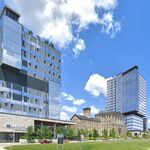fedplanner
Active Member
Actually, Glen what you are referencing is not sewer capacity but the potable water lines (water mains). I specifically mentioned potable water lines as an urgent infrastructure need in my post.
Here is where I read about the sewer line capacity: http://www.beachmetro.com/2012/12/18/city-talks-sewers-development-ward-32/
Here is where I read about the sewer line capacity: http://www.beachmetro.com/2012/12/18/city-talks-sewers-development-ward-32/
The short answer to what impact condo developments might have on sewage capacity, according to Bowering, is none. The Beach has a combined sewer system, which carries sewage during dry weather, as well as runoff from buildings during wet weather. Because the sewers were designed for carrying storm water, the amount of space taken up by actual sewage is a small fraction of the overall capacity of the pipe.
Last edited:




